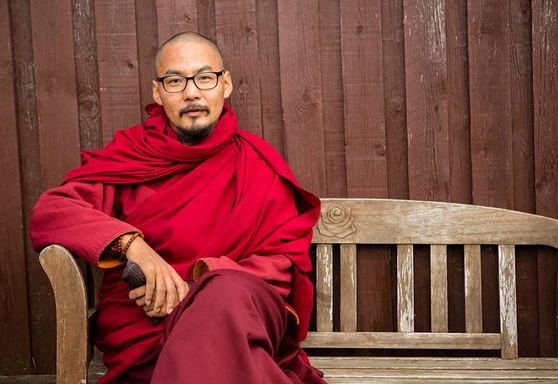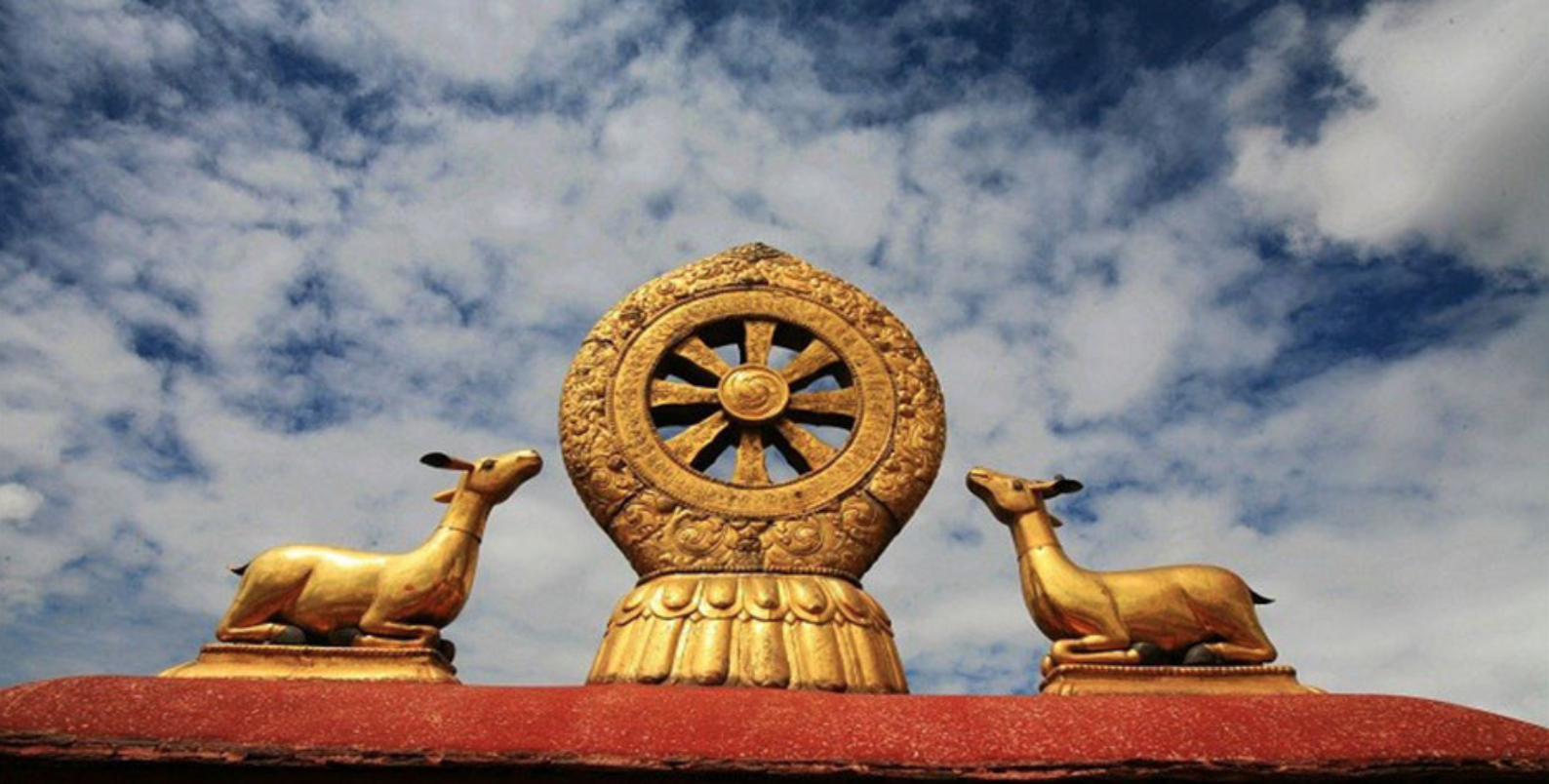Buddhist Khenpo Karma Gyurme. The nature of depression and the ways to get out of it.

Depression doesn’t care about your age, your education or how much money you have in your bank account. Fences, castles, monasteries or any other kind of barrier can’t stop it. Depression can reach anybody. Doctors claim that nowadays every one-in-ten people suffers from intense depression, while about one-in-five experiences different depression states at least once in their lifetime. Khenpo Karma Gyurme , Shedra’s (college) professor and senior teacher of Buddhist monastery Ka Nying Shedrab Ling, spoke with us about depression during his visit to Kyiv.
Why do more and more people suffer from depression?
Depression is a disease, where mind is the cause. Even though it seems that its origin lies in the events from the outside world, in fact, it is a reflection of the state of our own mind, our reaction to things. I think, that the mind, just like the body, has a certain breaking point. How much can we handle? Some people can take a lot, some – not so much. Every person has their own stress limit.
The world is rapidly changing and everything is happening fast. Our mind can’t catch up and so gets tired. When your body is exhausted and burned out, you get sick. When your mind is worn down, you have a depression. Nowadays, humans are under huge pressures from the outer world, caused by their way of living. I think, this is the reason why more and more people are suffering from depression.
Actually, there are many explanations for this disease. One of the main causes is – desire. When there are too many desires, you don’t really know what you want and what you need. You start to mix them up and mistaking the one for the other. For example, you need a pair of shoes – this is a necessity. But do you need 10 pairs of shoes? Do you need to buy a new pair every few weeks? You only have 2 feet! Desires are never ending. Nor are the disappointments we feel and efforts we make to try to get what we want. You will spend all your energy to get those 10 pairs. All this time you will think that those, who already have 10 pairs, are better than you. And when you finally get them and stock you wardrobe up, you will want one more pair – a newer one. Not many people are able to recognise fulfilment or feel satisfied, and that’s why most of us can’t stop and say: Enough!
Depression is when you chase desires and don’t feel contentment.
A short deviation: There is a term in Buddhism “ tanha” – a concept, that goes beyond ordinary desire. It’s an unconscious thirst that drives us – thirst for pleasures. Getting what we like, and disposing of what we dislike. It’s also an urge to become somebody. “Tanha” is leading us the wrong way: we believe that fulfilling our endless “I want” will bring us happiness. But in the end we realise that it does not make us as happy as we thought it would. This is exactly the type of desire or thirst that Buddha talked in the Second Noble Truth: “Desire is the cause of suffering”. Buddhism also differentiates another kind of want, “chanda”, which is based on a deeper understanding of existing things.
Another reason that might lead to depression is the fact that one doesn’t live in the present moment. When you always think about the past, you might feel stress or guilt. When you live in the future, you start worrying about the plans that may not succeed, or realise things are not going the way you planned. Thus you make yourself constantly stressful. No matter what you do, it is important to be in the here and now. For instance, when going out, not only your body should be at ease, but your mind as well. If you are having a family dinner, enjoy the food and company, and don’t think about work.
To live here and now doesn’t mean to stop planning or analysing your mistakes. It is needed to recall your experiences, analyse them and make conclusions out of them. But if you only live in the past, then regrets will surely arise. You will start to think: “What if I had done things differently?” But it is too late. You can’t go back in time and change what happened, can you? You are just torturing yourself. Thinking about the future can be just as tricky. Lots of fears arise. You constantly worry about the achievements of you plans. At some point an obsession may grow out of it: “That is how it must be done!” – and the reality upsets you. These factors bring depression, they are very harmful to one’s health. It is better not to get caught in an endless loop, but instead to think what you can do here and now.
How can society influence possible future depression?
We are social creatures and so, are the result of our community. If society restricts, puts pressure or expectations on us, it means that it’s very hard for relations to be open and fair. If I’m afraid to lose face – worry about other people’s opinions, I can’t truly be honest or can’t trust anybody and as a result become unhappy. There are more people suffering from mental diseases in developed countries. Tibet and Nepal are not developed. In one hand, it is not so good, but in the other – life there is more natural, more peaceful, which is better for mental health. Society and the rhythm of life is also a key point that can cause depression in a modern world.
Khenpo La, how about depression states in children? Can children who are born in a fast-growing society have a psychological immunity towards it?
From a medical point of view, depression can be genetic. But if we are talking about child’s depression, the key explanation in this case is the upbringing atmosphere and the environment. For modern people and children in particular, the important factor is the rhythm of life. The earlier a child leaves a house to go to a kindergarten or school, the less time he/she will spend with parents. This leads to barriers in communication. So even when you meet with your family, you can’t freely talk. A child, together with his thoughts and feelings, is as if in a tiny box with nobody to share them with. He spends the whole day in the kindergarten or school, and then goes to bed, seeing his parents for just a very short while. He lacks love. Moreover, children, same as adults, have to deal with their desires and frustrations. Sometimes it might be extra traumatic during adolescence, that’s why it is important to learn how to know yourself. This is not taught at school, and unfortunately, is not taught at home either.
It often happens when one starts on a spiritual path, he/she feels inspiration, uplifts, but soon becomes a victim of a severe depression, or even become deranged. Why does it happen?
I can’t talk for all the practitioners, but you usually start a spiritual practice with a certain aim. Therefore, if not reached, it might create contentment or frustration. If you think: “I force myself to become enlightened in a month!”, – you need to understand that it’s unrealistic. But if you promise yourself to devote 15 minutes to your practice every day, it will be more reasonable and easier to achieve the results. It’s a realistic plan and has meaning. The most important in a spiritual practice is to have adequate plans and discipline. Depression starts, when you want to get a lot in a short time, but you lack discipline and willingness to work on it yourself. You also need to be careful not to under or overestimate yourself. Without understanding your potential or when denying it, you won’t know what you need and want, and thus won’t be able to grow. First find yourself and then find your way. Understanding your potential doesn’t mean looking above your head and feeling very special, it means you know you can do it and know how to apply it. If you know your potential, you won’t waste your life – our life is too short to waste it on something that won’t help evolve it. This is what buddhists are dealing with.
Khenpo La, people, who suffers from slight depressions will definitely read this article. What would you recommend for them?
First of all, remember you didn’t do anything wrong. Depression happens due to circumstances, but its causes come not from outside, but inside of you. Second, know it is not eternal. Depression will pass. This means you are not helpless. You can do many, many things. Don’t doubt yourself! Third, meditation helps to fight depression, concentration on breathing exercises in particular. Meditate just a little, and in a short while you will feel better in the here and now. Fourth, learn to recognise contentment. And finally fifth, simplify your life. Simplifying is not about buddhism or asceticism. We are just getting rid of things, that provoke depression. First, you need to organise what you want. There are some things that are truly important, but there are some that you can live without. If you only think about the desires, then everything will appear to be important. Be honest with yourself. Toss aside what you don’t need and set priorities. Make your own Top 10 list of things you need. After, look at it critically and halve the number, leaving only what is genuinely important. And then reduce it to two lines and make realistic, specific aims. You can even set a time limit!
And what to do if people, who we love, are suffering from depression?
When a person suffers, not necessarily from a depression, there might often be a difficulty in communication. There’s no need for that. Be compassionate, even though it may be difficult to talk to a person who sees the world in darkness. Second of all, be patient. Depression won’t go in a month or two, sometimes it takes years. Just be with that person. There are other factors, that apply to everyday life – like maybe one needs a special diet, or medical treatment. For example, in Tibet we don’t call depression a disease – we say it’s an energetic imbalance. Don’t forget that your support could help a close person find harmony again.
Buddha Shakyamuni wasn’t depressed. Before he became enlightened, he understood there are a lot of things you simply can’t control, but he never thought that life was meaningless. He was convinced, he would find a way out of suffering. Enlightenment ceased his dual perception of the world, with its cravings and fears. Thus the depression’s psychological cause itself was eradicated, even though according to modern believes, Buddha had more than enough reason to be depressed!
Translated by Alina Doricheva
Thank you very much for this interview!
Support building of the Buddhist retreat centre JANGCHUB CHOLING –
https://gomdeua.org/jangchub-choling-ru.php
Follow Rangjung Yeshe Ukraine on Facebook –
https://www.facebook.com/RangjungYesheUkraine/
https://www.facebook.com/Rangjung-Yeshe-Gomde-Ukraine-Eng-1789050674741470/
Article was published at FireInSpire



